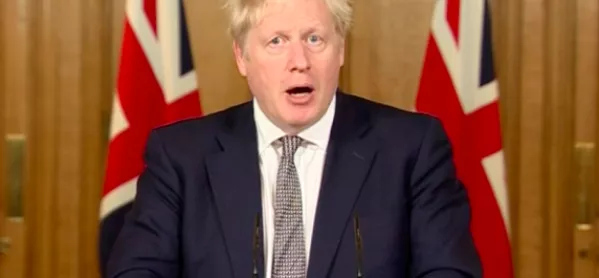The prime minister has said that reopening schools more widely today involves a “big budget of risk” and that it may increase Covid transmission rates.
Speaking at today’s briefing, Boris Johnson said the government would be driven by “data”, but added: “There are some encouraging signs...but remember where we were last summer. We had the disease down to levels much below where it is today and then we saw what happened with the spike.”
Revealed: The reality of social distancing for teachers
News: Tests U-turn to stop false positives grounding pupils
Schools reopening: Teachers struggle with parents’ consent on Covid tests
“I think it’s fantastic that the vaccine rollout is proving so successful, but don’t forget that there is a big budget of risk involved in opening schools today in the way that we are - that’s just inevitable,” he said.
Schools reopening: A ‘cautious and prudent approach’
“We think it’s manageable, we think it’s right, we think we’re prudent to be doing what we are. As I say, I think the biggest risk is not opening schools now, but we’ll continue to take a cautious and prudent approach.”
Jenny Harries, the deputy chief medical officer, said at the briefing that schools would “hopefully not” need to close again, adding: “I think we can be very optimistic going forward”, citing the vaccination programme.
“The testing programme in schools should mean that the likelihood of a case going into the school and then numbers of children having to come out of education to isolate should be very significantly reduced,” she said, adding, “there may be a very short period at the start of this programme where everybody gets used to it and a larger number of children come out of school and then it will settle down, so I think it’s really important that when observing this, people think through the next three to four weeks, not the first one to two”.
And asked about parents refusing permission to have their children tested for the coronavirus, Dr Harries said: “The first thing to say is children should always be able to come into school and it’s their right to have an education.”
“I do recognise that for many parents it’s quite an unusual ask before children go off to school to do a swab and a test - it will take time, I think, for families to get used to that, and one of the reasons the testing has been put in in a phased way is so that children have three tests in school in a supervised way with support so that they know what to expect. And my experience was, once the child knows what they want to do actually, as a parent you have less control over it once they saw what the benefits were and were not frightened of it,” she added.
“With time, I’m sure families will give their permission and will adopt it,” she said, saying it would be for the whole family’s benefit, although children would not be forced to take a test.
